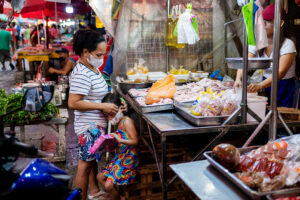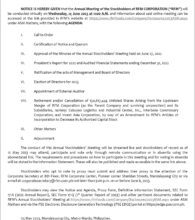Upside risks may prompt BSP to tighten policy in Q4

By Keisha B. Ta-asan, Reporter
SUPPLY SHOCKS to inflation and a weaker peso against the dollar may prompt the Bangko Sentral ng Pilipinas (BSP) to resume monetary tightening in the fourth quarter, according to analysts.
The future policy decisions of the US Federal Reserve may also push the BSP to start cutting policy rates in the second half of 2024.
Last week, the BSP maintained key interest rates for a fourth straight meeting on Sept. 21 but signaled it might resume tightening later this year if inflation pressures persist.
The Monetary Board kept its target reverse repurchase (RRP) rate at 6.25%, the highest in nearly 16 years. Interest rates on the overnight deposit and lending facilities were also left unchanged at 5.75% and 6.75%, respectively.
The Monetary Board hiked interest rates by 425 basis points (bps) from May 2022 to March 2023.
Security Bank Corp. Chief Economist Robert Dan J. Roces said a hawkish pause suggests that the BSP will continue to consider multiple factors before adjusting policy rates, such as inflation, the exchange rate, and economic growth.
“We think that the question of another hike this year is an increasingly close call, owing to the supply-side nature of the current inflation trend. A weak peso and a Fed hike will be the catalysts,” he said in a Viber message.
In an interview with Bloomberg TV on Friday morning, BSP Governor Eli M. Remolona, Jr. said a possible rate hike at its next policy review on Nov. 16 may not be the last amid risks to inflation. The Monetary Board’s last meeting is on Dec. 14.
“We’re not convinced it would be the last one. It won’t be the last hike in the cycle,” he said. “We’re still in a hawkish stance.”
Mr. Remolona said that if inflation last month had been worse, the Monetary Board would have hiked rates last Thursday.
“If the inflation numbers had been just a bit worse, we might have gone for a hike this time. Nonetheless, the vote was unanimous, but the numbers were pretty close between hiking and not hiking,” he said.
August inflation unexpectedly rose to 5.3% from 4.7% in July, bringing the year-to-date average to 6.6%. It also marked the 17th consecutive month that inflation breached the 2-4% target.
This prompted the BSP to raise its full-year inflation forecast to 5.8%, from 5.4% previously. It also revised its forecast for 2024 to 3.5%, from 3.3% previously, but maintained its 2025 forecast at 3.4%.
Mr. Remolona earlier said the BSP still projects inflation to return to the 2-4% target by November in the absence of further supply-side shocks.
“We continue to expect the BSP to hike its policy rate by 25 bps to 6.5% in the fourth quarter of 2023 if domestic rice prices spike again after the price cap is lifted by end-September,” HSBC ASEAN economist Aris Dacanay said in a note.
Prices of rice have spiked amid short supply, prompting the government to impose a price ceiling on regular milled and well-milled rice at P41 and P45, respectively.
“Whether rice will be inflationary or not will depend on how much the tariff rate on rice is reduced after the cap is lifted, a proposal is currently being debated amongst policy makers. In other words, we think monetary policy will be dependent on what the fiscal policy will be in the coming months,” Mr. Dacanay said.
Finance Secretary Benjamin E. Diokno earlier proposed to temporarily reduce the 35% rice import tariff rates to 0-10% in order to tame prices.
According to Mr. Dacanay, if the tariff rate is cut to 10% or less, rice prices may become disinflationary, and there would be less reason for the central bank to hike rates.
“But if the tariff rate is reduced insufficiently, rice will be inflationary. This may trigger the BSP to hike its policy rate to support the peso and tamp down any second-round effects from occurring,” he said.
For her part, China Banking Corp. Chief Economist Domini S. Velasquez said the recent supply shocks on inflation can still be addressed by non-monetary measures.
“Hopefully, the start of the harvest season for rice should help bring down prices in the coming months. Well-targeted subsidies to the transport sector could also further mitigate the effect of elevated oil prices globally,” she said in a Viber message.
In a note, BMI Country Risk & Industry Research said that while they are keeping their forecast for the BSP to keep policy rates steady through the rest of the year, a 25-bp rate hike is on the table.
“The US Federal Reserve has not completely ruled out the possibility of further tightening — a key risk that we have been highlighting. We think that the BSP will hike in lockstep with the Fed to maintain its external stability,” it said.
The peso has depreciated by 2.1% in the year-to-date against the greenback and is currently trending towards its one year low of P59.50.
Mr. Dacanay said the peso is under pressure of almost breaching the assumption parameter of the P54-P57 level against the dollar of the Development Budget Coordination Committee.
The local unit closed at P56.795 per dollar on Friday, strengthening by six centavos from its P56.855 finish previously.
According to Mr. Roces, the slower-than-expected economic growth in the second quarter puts more pressure on the central bank to stimulate economic activity.
“Sluggish growth will make inflation management even more challenging, thus we expect the BSP to seek a balance of the need to stimulate economic activity with the goal of price stability,” he said.
The Philippine economy expanded by 4.3% in the second quarter, the slowest in two years. For the first half, economic growth averaged 5.3%, below the government’s 6-7% target.
Mr. Roces expects the BSP’s hawkish hold to continue for the rest of the year.
“We still expect the policy rate to remain at 6.25% until the end of the year, seeing inflation to fall within target by late 2023 and average 5.6% for the year,” he added.




